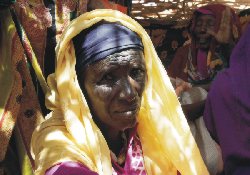Sudan crisis
Darfur
is situated in the West of Sudan and covers an area the size of France.
For a number of years it was the scene of sporadic clashes between farming
communities such as the Fur, Masalit and Zaghawa, and nomadic groups,
which led to many deaths and the destruction and looting of homes. The
government blamed competition over scarce resources for the clashes.
 In
February 2003 a new armed opposition group, the Sudan Liberation Army
(SLA) took up arms against the government, because of what they perceived
as the lack of government protection for their people and the marginalisation
and underdevelopment of the region. The support base of this armed group
came mainly from the agricultural groups in the region. Shortly afterwards
another armed group, the Justice and Equality Movement (JEM) emerged.
In
February 2003 a new armed opposition group, the Sudan Liberation Army
(SLA) took up arms against the government, because of what they perceived
as the lack of government protection for their people and the marginalisation
and underdevelopment of the region. The support base of this armed group
came mainly from the agricultural groups in the region. Shortly afterwards
another armed group, the Justice and Equality Movement (JEM) emerged.
The
government of Sudan responded by allowing free rein to Arab militias
known as the Janjawid (guns on horseback) who began attacking villages,
killing, raping and abducting people, destroying homes and other property,
including water sources and looting livestock. At times government troops
also attacked villages alongside the Janjawid, and government aircraft
have been bombing villages sometimes just before Janjawid attacks, suggesting
that these attacks were co-ordinated. The links between the Sudanese
armed forces and the Janjawid are incontrovertible, the Janjawid are
now wearing uniforms provided by the army.
Hundreds
of thousands of people have been forcibly displaced from their homes
as a result of actions by the Janjawid and the government forces and
large areas of Darfur have been depopulated. The UN estimates that there
are now almost one million internally displaced people in Darfur who
have fled from their burnt villages and taken refuge within Darfur,
mostly in towns and camps, often in very poor conditions, while more
than 120,000 have crossed the border into Chad.
According
to the report issued by the Office of the High Commission for Human
Rights in May "the mission identified disturbing patterns of massive
human rights violations in Darfur perpetrated by the Government of Sudan
and its proxy militia, many of which may constitute war crimes and/or
crimes against humanity. According to information collected, it is clear
that there is a reign of terror in Darfur".
Since
late 2003 hundreds of people from the Darfur region have also been arrested,
apparently because they were suspected of contacts with the armed opposition
groups operating in the region. Those arrested have been held under
Article 31 of the National Security Forces Act, which allows detention
for up to nine months without access to judicial review. Many of those
detained have said they were tortured in custody.
On
8 April the government of Sudan and the SLA and the JEM signed a cease-fire
agreement that was due to come into effect on 11 April. Under article
5 of the agreement "[t]he parties have decided to free all the
prisoners of war and all other persons detained because of the armed
conflict in Darfur" (article 5).
Amnesty
International is calling on all parties involved in the Darfur conflict
to immediately end human rights violations including the unlawful killing
and abuse of civilians. The organisation is also calling on the international
community to support the deployment of international human rights monitors
to Sudan.
Source:
Amnesty International.